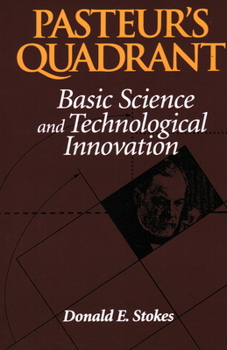Pasteur's Quadrant: Basic Science and Technological Innovation
Select Format
Select Condition 
Book Overview
Over fifty years ago, Vannevar Bush released his enormously influential report, Science, the Endless Frontier, which asserted a dichotomy between basic and applied science. This view was at the core of the compact between government and science that led to the golden age of scientific research after World War II--a compact that is currently under severe stress. In this book, Donald Stokes challenges Bush's view and maintains that we can only rebuild the relationship between government and the scientific community when we understand what is wrong with that view. Stokes begins with an analysis of the goals of understanding and use in scientific research. He recasts the widely accepted view of the tension between understanding and use, citing as a model case the fundamental yet use-inspired studies by which Louis Pasteur laid the foundations of microbiology a century ago. Pasteur worked in the era of the "second industrial revolution," when the relationship between basic science and technological change assumed its modern form. Over subsequent decades, technology has been increasingly science-based. But science has been increasingly technology-based--with the choice of problems and the conduct of research often inspired by societal needs. An example is the work of the quantum-effects physicists who are probing the phenomena revealed by the miniaturization of semiconductors from the time of the transistor's discovery after World War II. On this revised, interactive view of science and technology, Stokes builds a convincing case that by recognizing the importance of use-inspired basic research we can frame a new compact between science and government. His conclusions have major implications for both the scientific and policy communities and will be of great interest to those in the broader public who are troubled by the current role of basic science in American democracy.
Format:Paperback
Language:English
ISBN:0815781776
ISBN13:9780815781776
Release Date:August 1997
Publisher:Brookings Institution Press
Length:200 Pages
Weight:0.66 lbs.
Dimensions:0.6" x 6.1" x 9.0"
Customer Reviews
2 ratings
Excellent Book for Mentoring Undergraduate and Graduate Students
Published by Thriftbooks.com User , 16 years ago
This book provides a wonderful brief history of the transition in the USA between the end of World War II and the beginning of the USA-USSR Cold war in terms of national policy for supporting scientific research. Professor Stokes masterfully leads the reader through an elegant train of thought that provides a paradigm for simultaneously addressing "basic" and "applied" research without the oft seen excess baggage of which is "real" research. I have used the paradigm and exceprts from this book in numerous seminars in the U.S. and other countries when presenting seminars to graduate students and undergraduates. Many of today's students want to conduct research that makes a difference for pressing societal needs but also do not wish to be subjected to the criticism of not being enough of an "academic researcher" when conducting their thesis research. This book and the explained paradigm provide the framework for guidance for these students and their advisors/mentors. I highly recommend it and have given away nuemrous copies to colleagues wordlwide.
How to make science more accountable?
Published by Thriftbooks.com User , 26 years ago
This book is not about antiscientism, it is about accountibality of science funding. There are several economical myths related to the state policy of basic science funding. Two of them : "..basic research is performed without thought of practical ends" and "...basic research is the pacemaker of technological progress" as well as famous Baconian "linear model",( a sequence extending from basic science to technology: basic science - applied research - development - production and operations) are dramatically reevaluated and critizied in the reviewing book. The most important implications of agruments presented in this well written book are: a) Basic science must be accountable as any other state funding activities and based on "informed judgments of research promise and social need"; b) Progress of science and technology have "semiautonomous trajectories", therefore state investment in basic research does not provide progress in the technology and economical growth. It looks like it is a good time "to end" so-called "endless frontiers" of unaccountable spending of taxpayer's money for funding useless basic science research. Everybody who is interested in the basic science funding policy must read this excellent book. It demonstrates a difference between the economical reality and propaganda of illusions.





